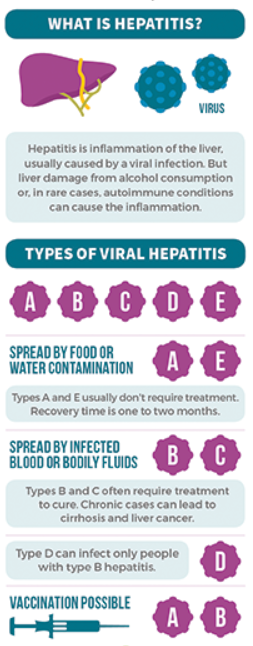World Hepatitis Day | 29 Jul 2020
Why in News
World Hepatitis Day is observed each year on 28th July to enhance awareness of viral hepatitis.
- The theme for the year 2020 is “Hepatitis-free future”, with a strong focus on preventing hepatitis B among mothers and newborns.
Key Points
- Hepatitis:
- The word hepatitis refers to any inflammation of the liver — the irritation or swelling of the liver cells from any cause.
- It can be acute (inflammation of the liver that presents with sickness — jaundice, fever, vomiting) or chronic (inflammation of the liver that lasts more than six months, but essentially showing no symptoms).
- Causes:
- Usually caused by a group of viruses known as the “hepatotropic” (liver directed) viruses, including A, B, C, D and E.
- Other viruses may also cause it, such as the varicella virus that causes chicken pox. SARS-CoV-2, the virus causing Covid-19 may injure the liver, too.
- Other causes include drugs and alcohol abuse, fat buildup in the liver (fatty liver hepatitis) or an autoimmune process in which a person’s body makes antibodies that attack the liver (autoimmune hepatitis).
- Treatment:
- Hepatitis A and E are self-limiting diseases (i.e. go away on their own) and require no specific antiviral medications.
- For Hepatitis B and C, effective medications are available.
- Global Scenario:
- Hepatitis B and C together are the most common cause of deaths, with 1.3 million lives lost each year.
- In 2016, 194 governments across the globe adopted WHO’s global strategy which aims at eliminating viral hepatitis by 2030.
- Indian Scenario:
- 40 million people are chronically infected with Hepatitis B virus and 6 to 12 million with Hepatitis C virus.
- In 2018, the government launched the National Viral Hepatitis Program. The program is the largest program for Hepatitis B and C diagnosis and treatment in the world.
Note:
- Hepatitis B is included under India's Universal Immunization Programme (UIP) which provides free of cost vaccination against eleven (excluding Hepatitis B) vaccine-preventable diseases i.e. Tuberculosis, Diphtheria, Pertussis, Tetanus, Polio, Pneumonia and Meningitis due to Haemophilus Influenzae type b (Hib), Measles, Rubella, Japanese Encephalitis (JE) and Rotavirus diarrhoea.
- Bangladesh, Bhutan, Nepal and Thailand became the first four countries in the World Health Organization’s Southeast Asia region to have successfully controlled Hepatitis B.
- Recently, an automated coronavirus testing device named ‘COBAS 6800’ was launched which can also detect viral Hepatitis B & C, among others.
- It can be noted that only for four diseases viz. HIV-AIDS (1st December), TB (24th March), Malaria (25th April), and Hepatitis, the World Health Organization (WHO) officially endorses disease-specific global awareness days.
